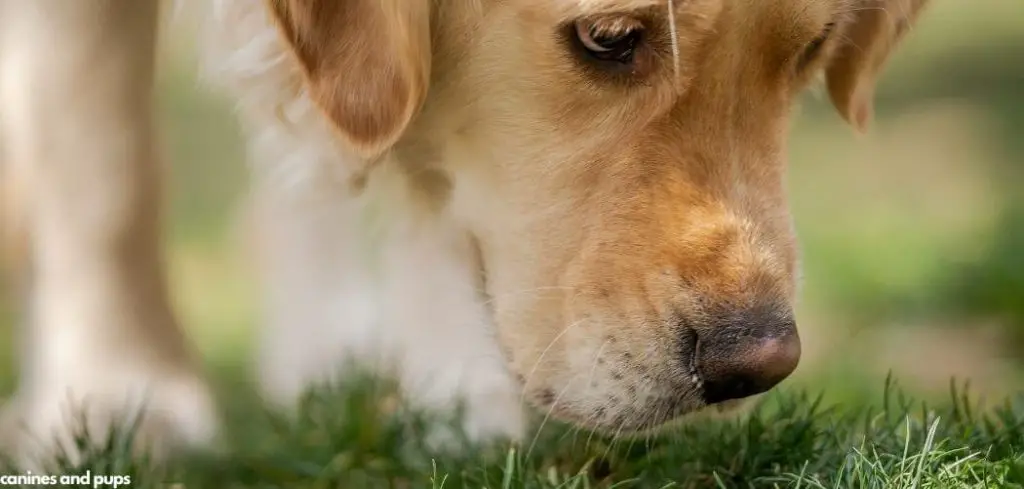Seeing your old dog eating grass can be surprising and sometimes concerning, especially if it’s a new or frequent behavior.
While many dogs nibble on grass occasionally, persistent grazing in senior dogs may signal underlying health or dietary issues.
We outline the common reasons for an old dog eating grass, what you can do at home, and when to seek veterinary help.
Old Dog Eating Grass — Why It Happens
An old dog eating grass can be due to dietary deficiencies, digestive discomfort, or behavioral tendencies. Older dogs may instinctively seek certain nutrients missing from their diet or try to induce vomiting if they feel unwell. Anxiety, boredom, or changes in routine can also trigger grass eating.
While often harmless, it can sometimes indicate gastrointestinal problems, nausea, or other medical concerns that require attention.

Old Dog Eating Grass: Common Causes
Nutritional Deficiencies
If your dog’s diet lacks essential vitamins, minerals, or fiber, they may chew on grass as a natural supplement.
Owners might notice their dog selecting particular types of grass or eating it more frequently than usual.
While occasional grazing is generally safe, ongoing deficiency can affect weight, energy, and overall health, so dietary evaluation is recommended.
Read more: Old Dog Eating Less (Understanding appetite changes)
Gastrointestinal Upset
Grass eating is often associated with nausea or an upset stomach. Dogs may chew grass to help induce vomiting and relieve discomfort.
Signs can include gagging, drooling, lethargy, or repeated attempts to vomit. Persistent gastrointestinal issues may indicate more serious conditions such as gastritis or intestinal blockages, requiring veterinary assessment.
Boredom or Behavioral Reasons
Older dogs may develop repetitive behaviors due to boredom, anxiety, or changes in environment.
You might notice grass eating occurs during times of inactivity or when left alone. While less medically concerning, it’s important to provide enrichment, exercise, and mental stimulation to prevent excessive grazing.
Parasites
Intestinal parasites can sometimes cause changes in appetite and grazing behavior.
Signs include weight loss, diarrhea, vomiting, and visible worms in stool. Parasite infestations can be serious in older dogs, so prompt veterinary testing and treatment are important.
Liver or Kidney Disease
Chronic organ diseases may cause nausea or changes in taste, leading dogs to nibble on grass.
Additional symptoms may include increased thirst, frequent urination, vomiting, and lethargy. Early detection and management can improve quality of life and reduce complications.
Stress or Anxiety
Environmental stressors, changes in household routine, or health-related discomfort can trigger grass eating as a coping mechanism.
Owners may observe pacing, whining, or other anxious behaviors alongside grazing. Addressing underlying stress through routine, comfort, and veterinary guidance is important for overall wellbeing.
What to Do If Your Old Dog Is Eating Grass
Observe your dog’s behavior and frequency of grass eating. Occasional grazing is usually harmless, but persistent or excessive eating may warrant attention.
Ensure your dog’s diet is balanced, high-quality, and appropriate for senior dogs. Adding fiber-rich foods or supplements may reduce the need for grazing.
Provide mental and physical enrichment. Regular walks, interactive toys, and attention can prevent boredom-induced grass eating.
Monitor for signs of illness, including vomiting, diarrhea, lethargy, or changes in appetite. Keeping a log of symptoms can help your veterinarian determine the cause.
If your dog’s grass eating is persistent, unusual, or accompanied by other symptoms, schedule a veterinary visit to rule out medical issues and discuss dietary adjustments or behavioral interventions.
When to Call or Visit Your Vet
Seek veterinary attention if your old dog:
- Eats grass excessively or persistently.
- Shows vomiting, diarrhea, lethargy, or unexplained weight loss.
- Displays signs of pain, nausea, or distress during or after eating grass.
- Has behavioral changes, loss of appetite, or other concurrent health concerns.
Timely veterinary evaluation ensures that underlying issues, including gastrointestinal, organ-related, or nutritional problems, are addressed promptly.
Read more: Old Dog Eating Dirt (Here’s Why)
Key Takeaway
An old dog eating grass may be responding to dietary deficiencies, digestive discomfort, behavioral reasons, or underlying medical issues.
While occasional grazing is often harmless, persistent or excessive behavior should be monitored carefully.
At-home measures include providing a balanced senior diet, ensuring mental and physical stimulation, and observing for any additional symptoms.
Persistent or concerning grass eating requires veterinary evaluation to rule out gastrointestinal, organ-related, or nutritional problems. Prioritizing observation and professional guidance ensures your senior dog maintains health, comfort, and quality of life.
